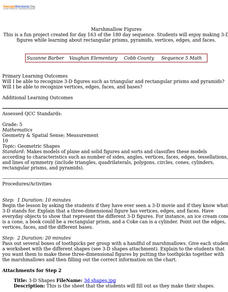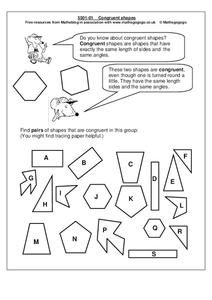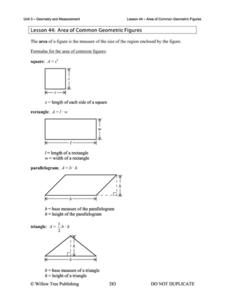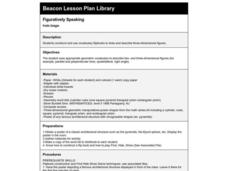SEN Teacher
Nets (3D Models)
Let your learners pick and create a fun shape from this custom template. Shapes range from complex geometric figures to the more common cube and prism. Each page can be labeled with your personal directions. Additional printable listed...
Curated OER
Living in a Geometrical World
Students participate in a series of hand-on, online, and multimedia activities to examine 2 dimensional and 3 dimensional shapes. They describe common geometric solids. They construct rectangular prisms using straws and ribbon.
Math Solutions
Shape Sorting: Looking for Green!
Young mathematicians rotate, flip, and sort their way to an understanding of the different attributes of geometric figures. Using transparent yellow and blue shapes, children try to match congruent figures together...
K12 Reader
3-D: It’s Not Just for Movies
This two-part reading comprehension exercise asks kids to read a short passage about cubes, rectangular prisms, spheres and pyramids, and then to respond to a series of questions about the article.
Curated OER
3-D Cubes
Students investigate cubes. For this geometric solids lesson, students review geometric concepts previously taught, then logon to a computer game in which they find cube figures and identify the shadow of hidden cubes.
Curated OER
Symmetry and Geometric Shapes on Campus
Build on your learners' previous knowledge of geometric shapes and symmetrical figures. Then set them out to take photos of geometric shapes on campus. They assess whether the photos contain symmetry or not.
Curated OER
Geometric Figures
In this identifying figures through segments worksheet, students find a square, rectangle, parallelogram, pentagon, and triangle by listing their sides in a large figure. Students solve five problems.
Curated OER
Marshmallow Figures
Students enjoy making 3-D figures while learning about rectangular prisms, pyramids, vertices, edges, and faces. After a lecture/demo, students use marshmallows, toothpicks and a worksheet imbedded in this lesson to create 3 dimensional...
Curated OER
Geometric Patterns
Geometric patterns illuminate this colorful and interactive PowerPoint. First, patterns must be identified. Next, students discern the missing color in a block pattern. Lastly, they observe a figure to determine how many blocks are used....
Curated OER
3-D Attributes
Students explore geometric solids. In this geometry lesson, students listen to the book The Greedy Triangle by Marilyn Burns, then work in groups to sort geometric solids into various categories. Students define geometric solids...
Curated OER
Congruent Shapes
In this congruent shapes worksheet, learners analyze a group of 20 geometric shapes that have letter labels. Students find pairs of shapes that are congruent in this group and write the letters of the shapes that match.
Curated OER
2-D and 3-D Presents at Pedro's Party
Fifth graders draw 2-D and 3-D shapes. They sketch and label geometric figures with correct terminology, then explore parallel and perpendicular lines. Pupils sort and classify shapes drawn.
Curated OER
Exploration with Geometric Solids
Students reinforce geometric concepts by playing "Guess My Solid." Through a process of elimination, they determine the shapes of mystery solids. Finally, students use various materials to construct their own geometric figures.
Curated OER
Geometric City
Students brainstorm names of plane and solid geometric figures. Afterward, they explore the skyline of large cities and note their agricultural shapes. Using construction paper, students build 3-D geometric structures to create a skyline...
Curated OER
Parallel and Perpendicular Lines
Learners study parallel and perpendicular lines. For this parallel and perpendicular lesson, pupils explore 2-D shapes and determine if the sides are parallel or perpendicular.
Curated OER
Mathematics in Art?
Fifth graders view prints of M.C. Escher's work. They look at examples of geometric figures and polygons and discuss places they have seen them. Students create their own tessellations. They write a report about the process they used in...
Curated OER
Investigation Area of Geometric Shapes
Fourth graders use triangle paper to design patterns using geometric figures and find the areas of those figures by counting units. Students are assessed by determining which figure has the greatest area and explaining their reasoning.
Curated OER
Geometric Shapes: Which Item?
Which item is shaped like a cone? Give students a chance to compare shapes, determining which item represents the prompted shape or figure (and which don't). Through 4 multiple-choice questions, scholars identify a cone, a cube, a...
Curated OER
Geometric Solids
Fourth graders examine the properties of geometric solids. Given geometric figures, they brainstorm observations. In groups, 4th graders identify solids and discuss the physical properties. Each student creates a Venn diagram and...
Willow Tree
Area of Common Geometric Figures
Scholars can use area formulas, but can they apply what they know about area? The activity challenges learners to think logically while practicing finding area of shapes such as rectangles, circles, parallelograms, triangles, and other...
Willow Tree
Perimeter of Common Geometric Figures
Help learners understand that perimeter and circumference are one in the same. Learners apply their skills to determine the perimeter/circumference of triangles, rectangles, and circles. They then use the same strategy to find the...
Curated OER
Geometric Probability
For this geometry worksheet, 10th graders determine the probability of an event occurring based on the geometric sketch. The one page worksheet contains sixteen problems. Answers are included.
Curated OER
Figuratively Speaking
Third graders construct and use vocabulary flipbooks to draw and describe three-dimensional figures. They utilize worksheets and access websites imbedded in this plan which help them construct their books.
Curated OER
Geometric Probability
In this geometry worksheet, 10th graders determine the probability of an event occurring based on the geometric sketch. The one page worksheet contains fourteen problems. Answers are included.























